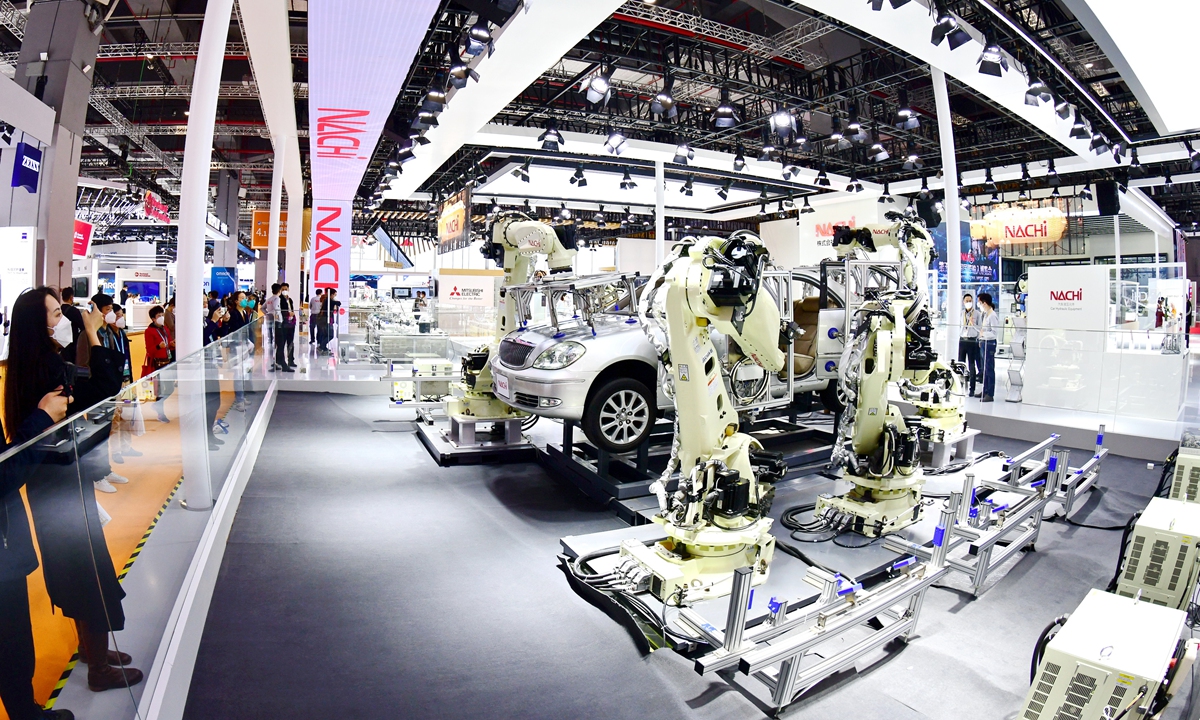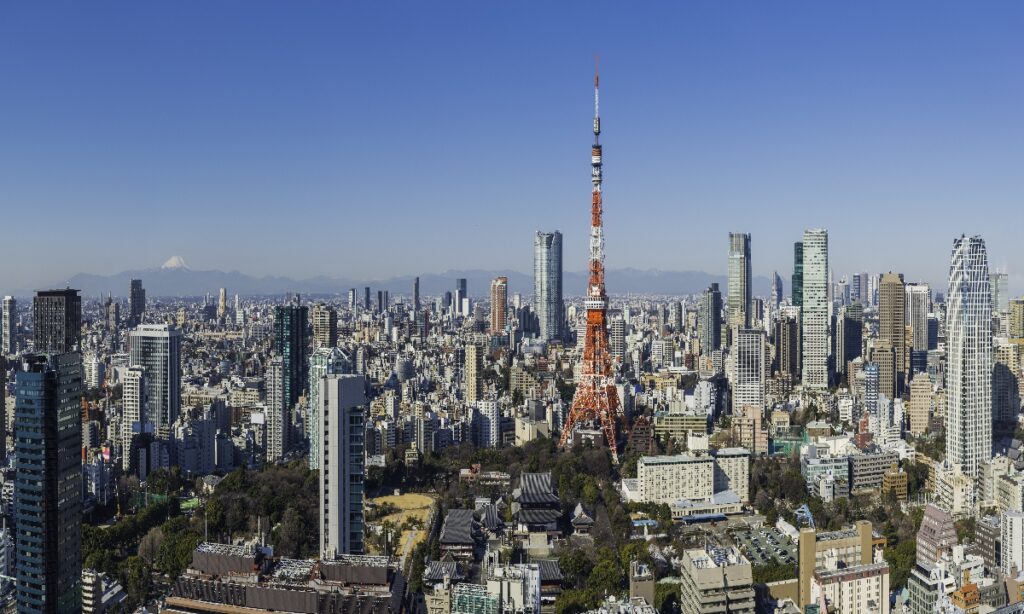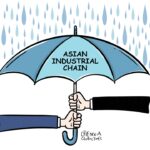National interests before politics
For some time, with the US trumpeting its intended “decoupling” from China, Japan, as a US ally, seems to be exploring the possibility of such a proposition. In this regard, some Japanese media outlets are concerned that Japan would have a lot to lose if the country does follow through.
The Global Times recently spoke with a number of Japanese economists and business executives who believe that “the full ‘decoupling’ of the Japanese and Chinese economies will be extremely costly, and both countries may lose in the end,” “normal economic and trade cooperation should not be used as a ‘pawn in political chess,'” and “Japanese companies do not want to be held hostage by the so-called political interests.”
These voices from the front line fully demonstrate that it is neither realistic nor feasible for the Japanese economy to afford to “decouple” from China.
Huge potential shock
In August, Honda launched a top-secret project which was aimed at large-scale supply chain restructuring to explore the possibility of manufacturing cars and motorcycles without dependence on China-made parts, Japanese media including Nikkei Asia reported.
“Are companies prepared for ‘zero-China’ ?” Nikkei Asia asked.
Many Japanese media outlets analyzed that Honda doesn’t currently envision a supply chain that is separate from China, but it wants to mitigate potential risks by creating a contingency plan should anything happen.
Honda’s response is somewhat representative of the Japanese business community. Several Japanese executives speaking on condition of anonymity told the Global Times that told the Global Times that the Japanese government plans to include the concept of “economic security” in its national security strategy, essentially expanding the scope of security and intentionally keeping pace with the US to keep China in check economically. From a business perspective, not only do these businessmen not want the “decoupling” reform, but they look forward to further deepening their economic engagement with China.
Many Japanese entrepreneurs noted that Japan is facing increasingly serious problems such as a sharply declining birthrate and an aging population, cooperation with China is the most feasible solution for the country to achieve exponential economic growth again. The Japanese business community cannot ignore the potential risks involved when Japan’s national policy is about to change, so most companies are trying to do business with China normally while preparing for possible risks and creating a “Plan B” to remain standing.
In an interview with the Global Times, Tomoo Marukawa, a professor at the University of Tokyo’s Institute of Social Science, said that the Japan-China economic relations are extensive and deep. China’s total GDP in 2021 was about 3.4 times that of Japan, with China’s foreign trade volume outperforming Japan’s four times over. Marukawa believes that it is clear from this data set that it would clearly hurt Japan more to assume a disruption of trade between Japan and China.
“If it does ‘decouple’ from China, Japan’s losses will be felt in many ways,” Marukawa said.
First, Japan will lose many kinds of important sources for daily household goods such as electric lamps, cell phones, televisions, refrigerators, furniture, clothing, toys, face masks, and foodstuffs such as buckwheat and vegetables. While Japan is not 100 percent dependent on China for the supply of these products, sources outside of China are either limited in supply or costly.
Second, Japan would lose its main export destination, Marukawa pointed out. He noted that Japan exports semiconductors, chemicals, and many other products to China. “‘Decoupling’ from China means that Japan would lose its most important export market, and this loss would be difficult to make up in other markets,” he said.
According to Japanese statistics, China has been Japan’s largest trading partner since 2007. When talking about the cost of separation from China, the Nihon Keizai Shimbun published a front-page article on October 18 stating that cutting off imports from China would cost Japan 53 trillion yen ($353 billion) in lost revenue, which is equivalent to 10 percent of Japan’s annual GDP going up in a puff of smoke.
“Some people don’t seem to realize this, and their memories are still stuck in the last century, thinking that China’s economy is only one-quarter or one-fifth that of Japan,” Marukawa said.

Japanese company Nachi-Fujikoshi displays its high-speed, multi-purpose robots at a car assemblage at the fifth China International Import Expo (CIIE) in Shanghai on November 8. Photo: VCG
Global industry chain stability key
“The advantages of China are obvious, especially because China has a huge consumer market. Japan is in a phase of population decline and its domestic market is gradually shrinking, so it is important for Japanese companies to pay greater attention to the market which has a population of more than 1.4 billion people,” Yusaku Nishimura, professor of the Institute of International Economy at the Beijing-based University of International Business and Economics, told the Global Times.
According to Nishimura’s observation, from the last few decades, direct investment by Japanese companies has shifted from “world factory-type investment” that used to regard China as a processing trade base to “world market-type investment” based on a consumption base.
Nishimura, who has lived in China since 2002, believes that the booming of new industries is another great advantage of China. In recent years, China’s new-energy vehicles, 5G technology, and other emerging industries have shown rapid development. In terms of both technology level and domestic market scale, these emerging fields have taken global leadership, and this will be the focus of investment for Japanese manufacturing companies in the future, he noted.
Nishimura said he was not sure who in Japan really touts “decoupling” from China, but he was clear that the opposition comes mainly from the business community.
In 2019, when the Donald Trump administration called for “decoupling” from China, Marukawa said, the US crackdown on Chinese companies such as Huawei would affect companies in many other countries, including Japan, and would interrupt the international industrial chain and breed a block economy.
“This is not the time when we must give up our business dealings with China, and there is no need to limit our own development for fear of ‘decoupling,'” he told the Global Times.
It is well known that the US government has asked Japan and other US allies to take actions to impose restrictions on semiconductor exports to China. Japanese government officials said that after having received the US proposal, Japan is also discussing what restrictions it can implement.
In a response, the Chinese Foreign Ministry spokesperson Zhao Lijian said in early November that the US has repeatedly abused export control measures, maliciously blocked and suppressed Chinese companies, and coerced allies to participate in the economic containment of China.
The US’ actions have greatly undermined the stability of the global industrial chain and supply chain, seriously violated free trade rules, and seriously damaged the economic development and people’s well-being of all countries, Zhao said.
Zhao also urged “other countries” to independently make correct judgments based on their own long-term interests and the fundamental interests of the international community.
“Japan is less willing to use its ‘economic weapon’ to put pressure on other countries,” Marukawa told the Global Times, while saying that, with the exception of some right-wingers, there are few voices in Japan advocating for “decoupling” from China.
If Japan wants to “decouple” from China, it will be done under the pressure from the US, Marukawa said. If Japan does not “get in step” with the US, then the US strategy of containing China’s advanced technology growth will be thwarted. Until now, Japan’s commercial “decoupling” from China has been limited to very few sectors, such as equipment exports to Chinese semiconductor makers, he said.
“China’s population and its total foreign trade volume account for about 18 percent and one-fifth of the world’s total respectively. Globalization without China is not true globalization, and ‘decoupling’ from China is just empty talk,” Yuki Izumikawa, an official of the Japanese Association for the Promotion of International Trade, shared his personal thoughts with the Global Times.
Izumikawa, who speaks fluent Putonghua and once served as an interpreter for Japanese politicians meeting with Chinese leaders, said that China’s huge market and its abundance of excellent high-end talent make the country highly attractive. At the same time, China has a stable and reliable government and macroeconomic policies committed to promoting common global development, both greatly supporting economic globalization.
‘Neither practical nor feasible’
“All factors considered, no country in the world can completely replace China,” Izumikawa stressed. He said that voices advocating for Japan’s “decoupling” from China come from those who misunderstand China under the hype generated by certain Western media pundits and politicians. Such a move is, however, not in the best interests of Japanese companies.
Rather, Japanese companies do not want to be trapped by political interests, nor do they want to be involved in the “retaliatory economic war” that the US and Japan have initiated against China, he said. For Japan, a commercial “decoupling” from China is neither realistic nor feasible.
This year marks the 50th anniversary of the normalization of diplomatic ties between China and Japan, but relevant celebrations in Japanese business circles are less common. Izumikawa, who had attended some related events, told the Global Times that due to the impact of the epidemic, daily exchanges between the two countries have been limited, while some Japanese media sources have intentionally or unintentionally promoted the Japanese people’s sense of vigilance against China, which has catalyzed their negative opinions, resulting in fewer exchanges between the two sides.
But Japanese companies’ appreciation of the Chinese market has not faded. Hideki Ozawa, head of Canon China, told the Global Times that his company has participated in the China International Import Expo (CIIE) for the last five consecutive years. He said that this year marks the 25th anniversary of the founding of Canon China. In retrospect, Canon’s rapid development in China in the last 25 years could not have been achieved without the support and care of the Chinese government, partners, and consumers, he said.
“The Chinese market is the fastest-growing and most dynamic market in the world, and one of the most important markets for Canon,” Ozawa said. “We are in an era full of volatility, uncertainty, complexity, and ambiguity, but as an old Chinese saying goes, ‘only the toughest grass can stand the strongest wind.’ So we hope to stand up to the challenges and broaden our market in China. We look forward to further development and progress in China.”
When All Nippon Airways (ANA) launched its China-Japan route in 1987, most of the passengers were Japanese. But over the last decade, with China’s rapid economic growth and increasing people-to-people exchanges between the two countries, the demographic trend of Chinese and Japanese tourists has been reversed, with Chinese passengers having accounted for more than 60 percent of the total before the COVID-19 global pandemic, Yuzo Hara, senior executive director of ANA and president of its Chinese branch of the airline, told the Global Times.
The international and domestic situation in Japan are still in great turmoil, and the Japanese government needs more time to think about how to get along with China, Izumikawa said. “In this context, it is important to expand economic cooperation between the two countries, which is highly complementary, and to make the Japanese government and society realize the importance of China. At no time should normal economic and trade cooperation be used as a political ‘playing card.'”
(Global Times)




